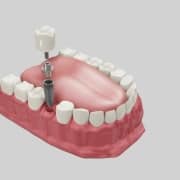5 Reasons to Replace Your Missing Tooth With a Dental Implant
Dental implants are an excellent prosthetic option for patients missing one or two teeth. As your dentist in Bellbrook, OH, the professionals at [practice_name] can help you decide whether a dental implant is the best choice. Below, we’ve listed five reasons to replace your missing tooth with a dental implant. We’re here to help! Here’s what you need to know.
1. Your Teeth Can Shift Out Of Place
Teeth can shift out of place when one tooth goes missing. Filling in the gap can help keep your teeth where they belong. This can affect the health of your bite and your long-term dental health.
2. Missing Teeth Can Affect Speech
A missing tooth can make speech difficult. Some people speak with a lisp when they’re missing a tooth, while other people may find it difficult to pronounce a variety of sounds. Some even find it hard to talk because they worry that their missing tooth is more visible when they speak.
Either way, when you’re missing a tooth, this can cause many problems with speech. It’s best to get your problems corrected as soon as possible.
3. It’s Harder to Chew With a Missing Tooth
Chewing is difficult – and even painful – when missing a tooth. Installing a dental implant can make chewing easier. This is important because chewing is an essential part of your digestion. If you’re missing a tooth, get it replaced as soon as possible to ensure you’re chewing correctly.
4. Missing Teeth Can Impact Self-Confidence
If you’re missing teeth, this can impact your self-confidence. Many people don’t like knowing that others can see when they’re missing a tooth. A missing tooth can make smiling more difficult and may make interacting with others harder.
5. Installing a Tooth Can Stimulate Your Jaw
If you choose to install a dental implant, the implant will stimulate your jaw like a natural tooth. This can prevent the loss of jawbone volume.
Want to know more about dental implants in Bellbrook, OH? Call [practice_name] today.






